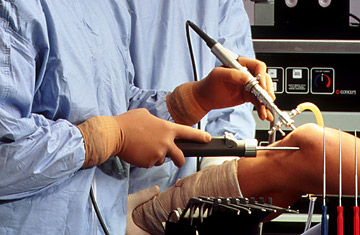Bone Doctor Is Just Another Name For Orthopedic Specialist

 Bone doctor, orthopedic specialist, orthopedic surgeon -- what's the difference? In a nutshell, there is no difference. All of these are terms for physicians who are trained and specialize in conditions of the musculoskeletal system (bones, joints, nerves, muscles, tendons, ligaments).
Bone doctor, orthopedic specialist, orthopedic surgeon -- what's the difference? In a nutshell, there is no difference. All of these are terms for physicians who are trained and specialize in conditions of the musculoskeletal system (bones, joints, nerves, muscles, tendons, ligaments).
Orthopedics was originally a medical specialty for children only, but modern orthopedic specialists treat all ages.
Becoming An Orthopedic Specialist
The first step in becoming a bone doctor after attaining a bachelor's degree is medical school; the choices are medical doctor (MD) or doctor of osteopathy (DO). DOs actually have an extra focus on the musculoskeletal system and perform spinal manipulation as part of the treatment process. After four years in medical school, the physician spends at least five years in residency, and many go on for at least one more year of specialized training. Most are also board-certified in their specialty.
The Nuts And Bolts Of Orthopedics
Since the musculoskeletal system takes up so much of the body, orthopedic specialists might deal with the spine, any extremity and any joint, as well as the connecting muscles, ligaments and tendons. A bone doctor treats sprains, strains, fractures, bone tumors, arthritis and birth defects. Many specialize in a particular area of the body, like the forearm and hand or lower extremities. Others focus on the spine, while still others primarily perform joint replacements. Although the skull contains bone, it's one area where bone doctors don't work; they leave that to neurosurgeons.
The Specialties In The Specialty
In addition to more generalized orthopedics, some bone doctors work in even more specialized areas. Limb lengthening, for example, is a procedure in which the bones of the legs are surgically cut; adjustable metal rods are inserted into the bones, and the limb is gradually lengthened over a period of several months.
 Some orthopedic specialists focus on children -- who have different orthopedic issues than adults – and, because they are still growing, may need special techniques or care to prevent injury to the growth plates of the bones. Other bone doctors specialize in trauma care.
Some orthopedic specialists focus on children -- who have different orthopedic issues than adults – and, because they are still growing, may need special techniques or care to prevent injury to the growth plates of the bones. Other bone doctors specialize in trauma care.
Not Just Surgery
Although orthopedic specialists are trained as surgeons, at least half of what they do is centered on medical management or prevention. Those who specialize in sports medicine, for example, devote a great deal of their attention to finding ways to prevent injury in athletes and weekend warriors. Rehabilitation is another key point in orthopedics, as musculoskeletal injuries can result in diminished flexibility or strength.
Procedure-Driven Care
Much of what orthopedic surgeons do is done in the operating room, where a wide array of equipment, procedures and techniques are used to provide care. For example, an arthroscopy is a way to perform surgery with a special camera and equipment that needs only a few small incisions.
 Arthroscopic procedures take less time, cause less trauma and heal more quickly. Bone doctors may “fuse” bones with bone grafts or metal devices, or completely remove a diseased or damaged joint to insert a metal/plastic prosthetic joint (total joint replacement).
Arthroscopic procedures take less time, cause less trauma and heal more quickly. Bone doctors may “fuse” bones with bone grafts or metal devices, or completely remove a diseased or damaged joint to insert a metal/plastic prosthetic joint (total joint replacement).
Do I Need An Orthopedic Doctor?
Although you may start out with your family physician if you have an injury or musculoskeletal pain, there may come a point when you need an orthopedic consultation. Your family doctor will usually make the suggestion, but there are some indications you can look for: pain that isn't getting better and loss of flexibility or function are often indications more specialized care is necessary.
Choose an orthopedic specialist just as you would any other doctor. Look for evidence of specialized training and certification in the field. Like any doctor, your orthopedic specialist should be able to build rapport, answer your questions clearly and be responsive to your individual needs. In addition to recommendations from your family doctor, you can check with local hospitals, online sources, and family and friends to find the right match.

